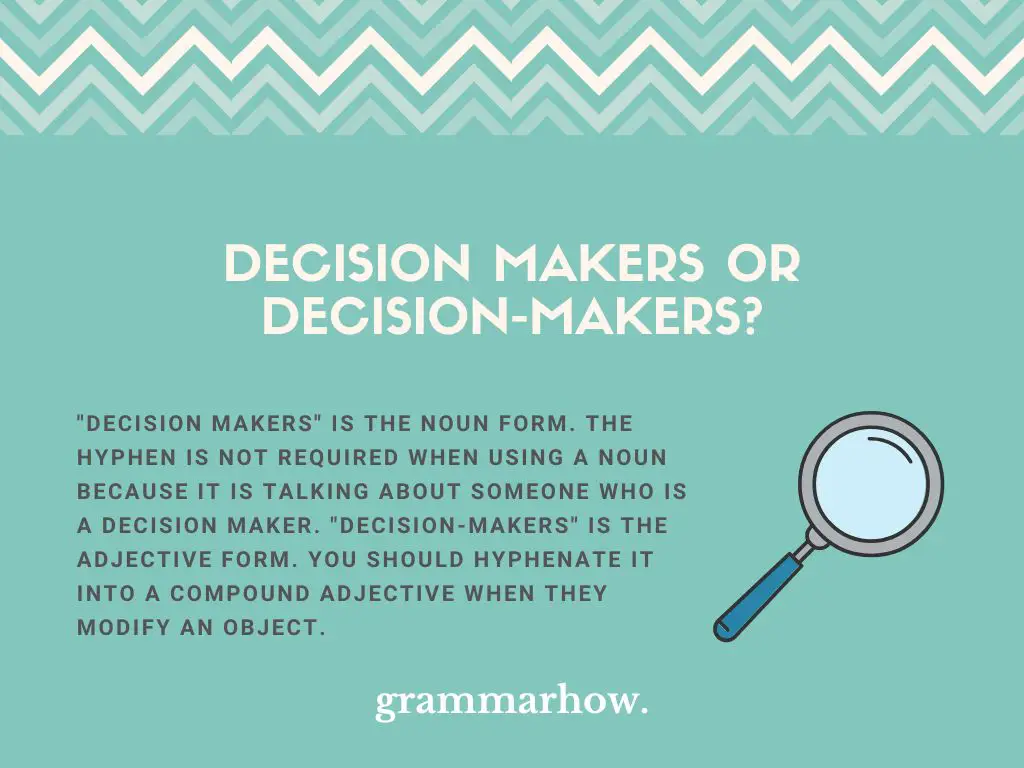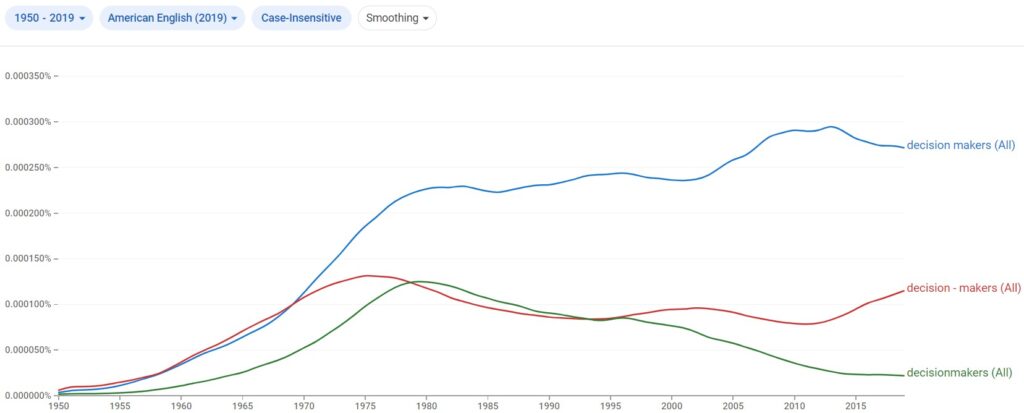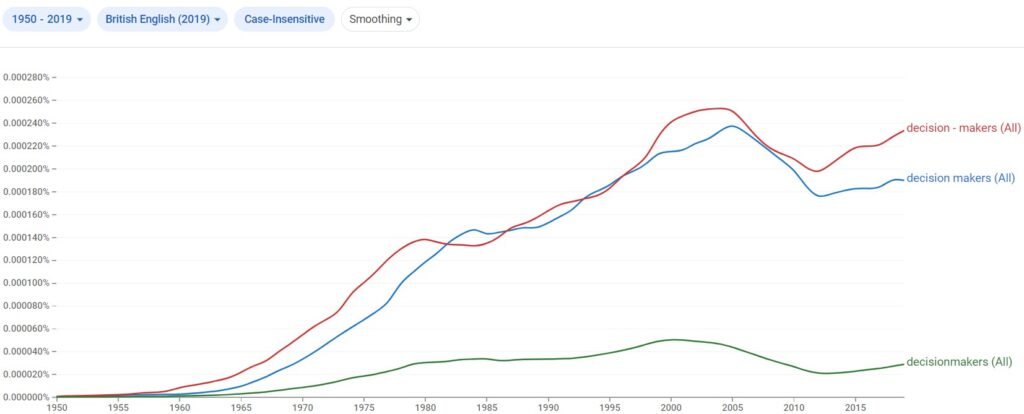“Decision makers” is a fairly common phrase when talking about the people you decide things. You might come across it as a hyphenated form, but you may have also seen it as one or two words. This article will explore the correct form you should use.
Decision makers or Decision-makers?
“Decision makers” is the noun form. The hyphen is not required when using a noun because it is talking about someone who is a decision maker. “Decision-makers” is the adjective form. You should hyphenate it into a compound adjective when they modify an object.

You can refer to common stylebooks like The AP Stylebook or The Chicago Manual of Style to learn more about hyphen rules. Both style books teach you to hyphenate adjectives when they modify the same noun.
This helps the reader to understand where the modification comes from.
Here’s a quick demonstration of the different forms:
- Noun: Sarah is the decision maker. You should speak to her.
- Adjective: That is a decision-maker tool. I wouldn’t touch it.
“Tool” is an object in the adjective example. It is modified by “decision-maker,” so a hyphen is required.
Decision makers
“Decision makers” can be written as two words. You should write it in this manner when it is a noun, meaning that someone (or something) is a “decision maker.”
The hyphen is not required here. AP Style suggests that nouns do not need to be hyphenated unless it helps to make things clearer for the reader.
Here are some examples to see how to use “decision makers” in a sentence:
- We are the decision makers here. We do not think it’s wise for you to stick to these issues.
- Decision makers are always the worst people. They feel like they know everything, and it’s so annoying.
- She was a decision maker once. I don’t know if she’s still got the power to do that, though. They didn’t like her.
- I’m the decision maker. Whatever I say is final. I don’t want you to argue with me anymore.
- The decision maker has made it clear already. He does not want you to talk to him about it further.
Decision-makers
“Decision-makers” should be hyphenated as an adjective. It is a compound adjective when written like this, meaning that both “decision” and “makers” can modify the same noun that comes after it in a sentence.
It’s a good idea to stick to the rules from the AP Stylebook. You should hyphenate more than one word when they are used to modify the same object. The object usually comes straight after the hyphenated form.
These examples will show you how to use “decision-makers” in a sentence:
- Have you noticed the decision-maker workspace is all over the place? I don’t know what happened there.
- The decision-maker meeting is happening in a short while. You need to attend to see how it goes.
- The decision-maker conundrum is what we’re focusing on today. You have to know when to give it a rest.
- A decision-maker scheme will help us to figure out who the best leaders are. Do you want to help with that?
- Let’s go through the decision-maker proposals one last time. I think it’s a good idea to get this sorted out.
There is one exception to using the hyphenated form “decision-makers” as a noun. In British English, “decision-makers” is often a compound noun (meaning that the hyphen is present). This is because it makes it clear to the reader that the “decision-maker” is one person.
Here’s how you might use “decision-maker” as a noun:
- Sandra is the decision-maker. We do not want to step on her toes, so we like to leave her to it.
- I’m the decision-maker. Whatever I say is what we have to do. It’s really quite simple.
- The decision-makers should be here any minute now. We just have to wait and find out what they say.
Decisionmakers
“Decisionmakers” is never correct as one word. You cannot group the words like this because it removes the original intention behind the meaning. You must keep the words separate or group them with a hyphen.
Removing the space is never an option.
These examples will help you remember what the correct form is (for both the noun and adjective forms):
- Correct: I am the decision maker. I’ll do whatever I can to ensure that things work out well.
- Incorrect: You are decisionmakers. We will come to you when we need help figuring this out.
- Correct: The decision-maker radio is going off again. Does anyone want to listen in?
- Incorrect: I have a decisionmakers quarry with him. I’m not sure if I’m going to figure it out.
Decision makers or Decision-makers in the UK vs. US?
According to Google Ngram Viewer, “decision makers” is the most popular choice in American English. This shows that they rely on the unhyphenated noun form when using it. “Decision-makers” is fairly popular, but the one-word “decisionmakers” is rarely used.

According to Google Ngram Viewer, “decision-makers” is the most popular choice in British English, followed closely by “decision makers.” This shows that both forms are correct as a noun. Only the hyphenated form is correct as the adjective, allowing it to be the more popular option.

American English uses “decision makers” as a noun and “decision-makers” as an adjective. British English uses “decision-makers” as both a noun and adjective, while the two-word variation is only correct as a noun.
Neither language uses the one-word “decisionmakers.”
Decision-makers or Decision-Makers?
“Decision-makers” and “Decision-Makers” are both valid capitalization options.
Different stylebooks suggest different rules for capitalizing titles. AP Style will encourage you to write “Decision-makers,” where “makers” is kept in the lower case. APA Style and The Chicago Manual of Style encourage “Decision-Makers” to have both words capitalized.
The style you write with is what dictates how you capitalize a hyphen form in your writing.
Final Thoughts
“Decision-makers” and “decision makers” are both correct. The one-word variation is commonly used as an adjective, though British English also allows it to be a noun. “Decision makers” is only ever correct as a noun. You should not use “decisionmakers” as one word.

Martin holds a Master’s degree in Finance and International Business. He has six years of experience in professional communication with clients, executives, and colleagues. Furthermore, he has teaching experience from Aarhus University. Martin has been featured as an expert in communication and teaching on Forbes and Shopify. Read more about Martin here.
